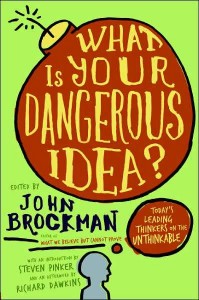 After reading This Explains Everything, I’m now a bit addicted to the Edge.org series of books, in which John Brockman poses a question to some of the leading minds in the world. I quickly went through the second and am now on the third of these books.
After reading This Explains Everything, I’m now a bit addicted to the Edge.org series of books, in which John Brockman poses a question to some of the leading minds in the world. I quickly went through the second and am now on the third of these books.
The second, What is Your Dangerous Idea?, asks exactly that question: what idea do you have or do you think is dangerous? The meaning of dangerous is in the eye of the beholder, with some contributors discussing ideas that might be coming from science that might be taken in the wrong way by politicians or those who would repress others (such as innate differences in people in terms of abilities of various sorts) to ideas that would shatter the status quo (such as the discovery of alien life or the idea that we may soon be able to control our own evolution). Most of the ideas are very interesting and, as with the previous volume I read, thought provoking. Worth a read if for nothing else than to stir the mental juices and get one thinking about ideas that might not normally cross one’s mind. However, there is one set of ideas that I found particularly striking.
The first relates to free will. In back-to-back essays, first Eric Kandel and then Clay Shirky touch on this. Kandel describes experiments in which the subconscious mind is measured to register activity before the conscious mind is aware it is about to do something. That is, if one were asked to move their finger, there is subconscious activity before the person has actually made the decision to move their finger (or, better said, is consciously aware of the decision). Shirky discusses how this has important consequences on how we interact with and are manipulated by advertisers and politicians, amongst others. In particular, he states “everyone from advertisers to political consultants increasingly understands, in voluminous biological detail, how to manipulate consciousness in ways that weaken our notion of free will.” (In a super-cool aside, it seems that Helmholtz, the famous physicist who was instrumental in the development of thermodynamics, was the discoverer of this subconscious activity.) The implication, really, is that advertisers and politicians know us better than we know ourselves, and know how to target messages to our subconscious, which is much more important for our decision making and behavior than we are ever aware. It is only through recognizing this and knowing how our subconscious responds to such stimuli that we have any hope of not being manipulated. Mahzarin Banaji sums this up nicely with a quote from Richard Dawkins: “Let us understand what our own selfish genes are up to, because we may then at least have a chance to upset their designs, something that no other species has ever aspired to do.”
Other essays touch on this theme. Richard Nisbett points out how “When our behavior is insufficiently justified, we move our beliefs into line with the behavior, so as to avoid the cognitive dissonance we would otherwise experience.” The bottom line: we really don’t know how we think, why we think what we think, or where our thoughts come from. Those that do and are willing to use that understanding can manipulate us without us even being aware.
One thought on “What is Your Dangerous Idea? edited by John Brockman”